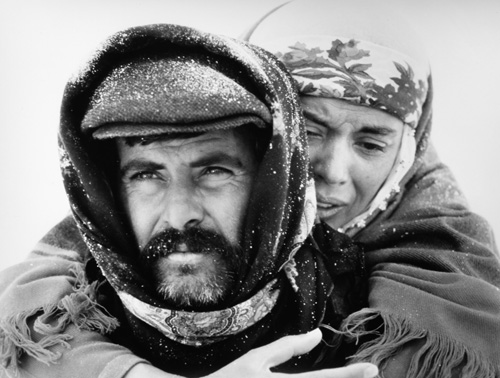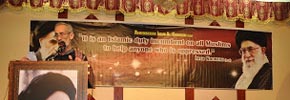Sima Sahar Zerehi – It’s strange how great art is timeless even in a medium as transitory as cinema, which relies on technology to deliver its message to the viewer.
Sitting in TIFF’s Bell Lightbox theatre watching a media screening of Turkish filmmaker Yilmaz Güney’s Yol (The Way) it dawns on me that this film is as relevant today in an era of revolutions in the Middle East as it was in 1982, the date of its release.
In a timely move, the Toronto International Film Festival will be presenting a retrospective on the master filmmaker titled The Way Home: The Films of Turkish Master Yilmaz Güney. This once-in-a-lifetime opportunity will allow Toronto audiences to get the rare chance to see these hard to find titles in the state-of-the art TIFF theatres.
From January 26 to February 5, 2012 the retrospective will feature eight films by Yilmaz Güney including Hope (Umut) 1979, often compared to Italian director Vittorio De Sica’s Bicycle Thieves.
Elegy (Ağit) 1971, a powerful study of rural poverty and oppression; and Güney’s most celebrated film, directed by proxy from prison. The footage for this film was smuggled to Switzerland and edited in Paris.
The Way (Yol) 1982, a poignant critique of political, religious, and sexual oppression that received the Palme d’Or and the International Critics Prize at Cannes.
Other films featured include The Herd (Suru) 1978-79, The Poor Ones (Zavallilar) 1974, Bride of the Earth (Seyit Han) 1968, The Hungry Wolves (Ac kurtlar) Turkey 1969, and The Friend (Arkadas) 1974.
The retrospective, which is touring to select film institutions in North America is organized by Erju Ackman in collaboration with the Güney Foundation.
While Yilmaz Güney may not be a household name to many new film buffs, aficionados of the history of Middle Eastern cinema will surely be familiar with this Turkish-Kurdish actor/director’s large body of work and its impact on the development and evolution of filmmaking in the region.
Yilmaz Güney was a Kurdish director, screenwriter, novelist and actor from Turkey well known for his portrayals of ordinary working class people and their socio-political struggles.
Raised by parents who worked as cotton laborers, Güney grew up amongst the working poor, a background that became central to his work as a filmmaker.
Güney was one of a handful of Turkish directors who was committed to using cinema as a tool for political education and social change by directing his lens to capture the plights of the working poor. His brand of social realism was a stark change to a Turkish cinema populated by state-sanctioned war films, play reenactments and melodramas.
Starting as an apprentice screenwriter for an assistant to Atıf Yılmaz, Güney soon advanced to acting and rose quickly to fame, starring in as many as 20 films a year and earning the nickname ‘Çirkin Kral,’ (the Ugly King) or ‘pasha nashrin’ in Kurdish.
In 1961 at the height of his acting career, Güney was imprisoned for 18 months for publishing a so-called communist novel. This was to be the first in a series of prison terms the filmmaker was subjected to throughout his life at the hands of Turkey’s military regime for his support of leftist politics and of Kurdish nationalism.
By 1965 Güney, transitioned from acting to directing and by 1968 he had created his own production company titled Güney Filmcilik. His films throughout the 70s and early 80s, with titles such as Hope and Pain serve as analogies for the sentiments of the Turkish people towards a tyrannical regime.
Although he spent much of his adult life in prison, Güney continued to produce screenplays from behind bars including Sürü (The Herd) 1978, and Düşman (The Enemy) 1979, both directed by Zeki Ökten.
Düşman (The Enemy) won an honourable mention at the 30th Berlin International Film Festival in 1980.
In his last interview with journalist Chris Kutschera, Güney laments “The Herd, in fact, is the history of the Kurdish people, but I could not even use the Kurdish language in this film; if we had used Kurdish, all those who took part in this film would have been sent to jail.”
After escaping from prison in 1981 Güney took refuge in France. In 1983 he returned to directing with a screenplay about the lives of imprisoned children in his final film, Duvar (The Wall) 1983, which was made with the cooperation of the French government.
For today’s audience Güney’s films can offer not only a history lesson about a turbulent historical time in Turkey but also an artistic framework that showcases the inspiration for many contemporary filmmakers from the region. These films are essential viewing for any student of film, history, or social and political change.





